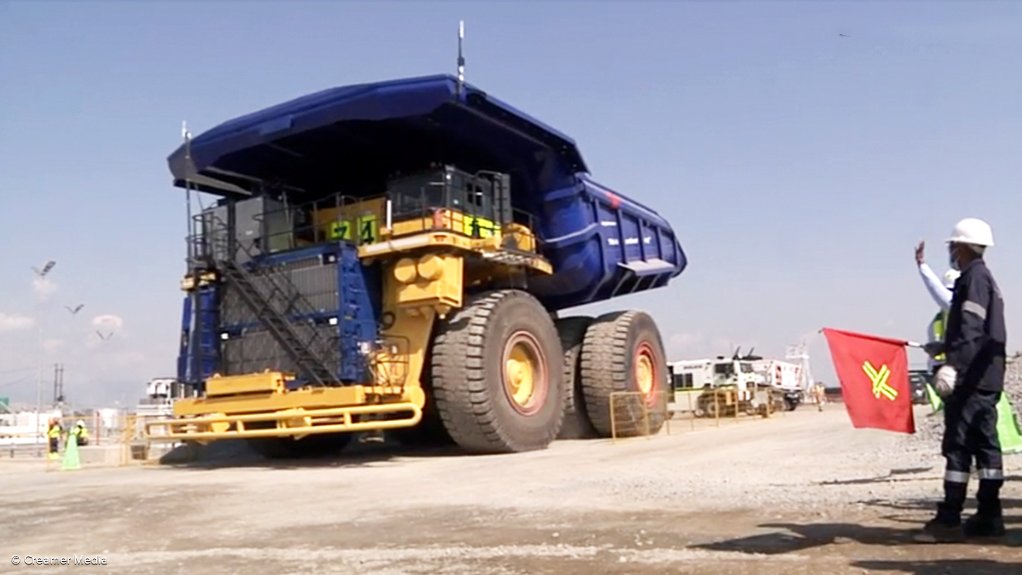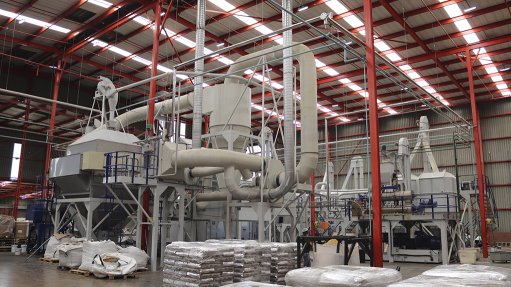Nel's revenue rises as large-scale electrolyser contracts roll in


Nel helped to develop a hydrogen-powered mine haul truck for Anglo American Platinum.
Photo by Creamer Media's Donna Slater
Norwegian hydrogen solutions company Nel ASA has reported revenue of NKr414-million for the fourth quarter of 2022, up from NKr248-million in the same quarter of 2021.
The increase in revenue was driven by a NKr600-million contract for the delivery of electrolysers to Australian energy company Woodside Energy – the largest order that Nel has ever received. The electrolysers will be used for liquid hydrogen production in Oklahoma, in the US, for major transport companies. The contract includes stack, balance of stacks and engineering.
Additionally, a NKr120-million contract was also entered into with renewable energy company Statkraft during the period. The 40 MW of electrolyser equipment will be used to produce green hydrogen in one of Statkraft’s hydrogen projects. Statkraft’s ambition is to have a production capacity of 2 GW of renewable hydrogen by 2030.
Post quarter-end, Nel announced that it had also received a purchase order from green hydrogen producer HyCC worth about NKr125-million.
Overall, Nel’s order intake for the fourth quarter was NKr982-million, up 135% year-on-year, with as much as 92% made up of electrolyser orders. Similarly, the full-year order intake for 2022 of NKr2.28-billion was also up 135% compared with that of 2021.
Nel CEO Håkon Volldal noted on February 28 that external and internal analysis supported a market view that multiple gigawatts of electrolyser projects would be reaching final investment decision (FID) before 2025, with industrial applications representing the most promising near-term opportunities.
“The electrolyser industry is going from small to large scale. Projects come first in mature markets, before large greenfield installations integrated with renewable energy sources gradually are expected to become another important market segment,” he said.
Platinum, in conjunction with iridium, is used as a catalyst in proton exchange membrane (PEM) electrolysers, which use a solid polymer electrolyte, one of the two leading electrolysis technologies available on the market. South Africa is the largest producer of platinum in the world by a significant margin, with production amounting to an estimated 140 t in 2022. Moreover, South Africa vies with Russia for the top spot in terms of iridium production.
Nel is the largest manufacturer of electrolysers globally, having delivered more than 3 500 units to more than 80 countries since 1927. The company can produce up to 1 GW of alkaline electrolysers and up to 500 MW of PEM electrolysers a year.
The company also makes fuelling stations for hydrogen. It has already delivered or is currently in the process of building about 120 H2StationTM solutions in 14 countries.
At the end of the fourth quarter, the company had a backlog of orders valued at NKr2.61-billion, which is an increase of 112% compared to the fourth quarter of 2021. Nel’s cash balance at the end of the quarter was NKr3.14-billion.
Nel reported that all segments, including its fuelling business, PEM electrolysers, and alkaline electrolysers, experienced growth compared to the same quarter in the previous year. Revenues from sales of alkaline electrolysers increased 337% compared to the same quarter last year, and quarterly sales of PEM electrolysers increased 14% from 2021.
In terms of the company’s fuelling business, revenues were suppressed by supply chain disruptions, which resulted in longer delivery times, some of which accumulated into revenues during the quarter.
Despite the strong overall results, Nel reported a loss before interest, taxes, depreciation and amortisation of NKr216-million, driven by losses in the fuelling division, low margins on electrolyser projects signed in 2020/21 and increased personnel expenses to prepare for large-scale projects. The full-year loss before interest, taxes, depreciation and amortisation was NKr780-million, compared with a loss of NKr475-million in 2021.
As a result of the company’s fuelling segment’s financial performance and delayed growth trajectory, Nel impaired all goodwill previously recognised in the fuelling sector by NKr296-million. The company also recognised an impairment of other intangible assets in the fuelling business by NKr31-million.
“Nel is committed to building the organisation and production capacity to meet expected market growth, while simultaneously delivering on increasingly larger and more complex projects. This continues to impact the quarterly results. Setting up project protocols, partnerships, and systems are still in its early stages. While the company has made notable improvements in ability and effectiveness, further developments are necessary to secure margins and increase profitability,” Volldal explained.
He said both the fuelling and electrolyser business segments faced execution challenges.
“The company's amended electrolyser strategy on large projects is to narrow the scope and concentrate on stacks and balance-of-stacks. As projects grow in size, Nel will partner up with world-class engineering, procurement and construction companies. This allows Nel to focus on its core scope while bringing a competitive solution for the hydrogen production system to the customer,” Volldal said.
He explained that the reduction of scope would reduce execution risk and improve margins for the equipment produced and sold.
Similarly, the company’s fuelling division has narrowed its technology development focus and will increasingly work with partners to focus on the core development necessary for high-capacity fuelling.
The company also made an investment decision to increase its PEM production capacity in Wallingford to around 500 MW, with total capital expenditures estimated to be around NKr260-million. The new capacity is expected to peak in 2025.
“We experience a strong market momentum and a high order intake, and we foresee this trend to continue going forward. Terms and conditions are improving, and we are now winning attractive large-scale projects with solid margins and manageable risk profiles,” Volldal said.
As the market shifts towards large-scale projects, Nel has developed an ambitious electrolyser strategy.
“We aim to be the leading provider of electrolyser equipment with a 20% to 30% market share outside China,” Volldal said.
To reach this ambition, Nel will continue to grow production capacity, offer the best technology with the lowest levelised cost of hydrogen, and narrow its scope of delivery to stack and balance-of-stack.
For its fuelling division, Voldall said that short-term challenges will likely persist. An unfocused market approach has led to high organisational and operational complexity driving cost. Also, immature and non-standardised technology has resulted in high-quality costs, which increase with higher station use.
“Despite the current poor performance, we see substantial market potential for heavy-duty hydrogen fuelling equipment. Some of the largest energy companies in the world, which are Nel customers, have made long-term commitments to developing this infrastructure,” Volldal said.
He said Nel was looking to capitalise on its experienced workforce and fuelling technology by reducing current complexity and transitioning towards standardised high-capacity products, as well as assessing strategic partnerships and alternatives to improve the business case.
Volldal noted that external and internal analyses supported a market view that multiple gigawatts of electrolyser projects would be reaching FID before 2025, with industrial applications representing the most promising near-term opportunities.
“The electrolyser industry is going from small to large scale. Projects come first in mature markets, before large greenfield installations integrated with renewable energy sources gradually are expected to become another important market segment,” he said.
Article Enquiry
Email Article
Save Article
Feedback
To advertise email advertising@creamermedia.co.za or click here
Comments
Press Office
Announcements
What's On
Subscribe to improve your user experience...
Option 1 (equivalent of R125 a month):
Receive a weekly copy of Creamer Media's Engineering News & Mining Weekly magazine
(print copy for those in South Africa and e-magazine for those outside of South Africa)
Receive daily email newsletters
Access to full search results
Access archive of magazine back copies
Access to Projects in Progress
Access to ONE Research Report of your choice in PDF format
Option 2 (equivalent of R375 a month):
All benefits from Option 1
PLUS
Access to Creamer Media's Research Channel Africa for ALL Research Reports, in PDF format, on various industrial and mining sectors
including Electricity; Water; Energy Transition; Hydrogen; Roads, Rail and Ports; Coal; Gold; Platinum; Battery Metals; etc.
Already a subscriber?
Forgotten your password?
Receive weekly copy of Creamer Media's Engineering News & Mining Weekly magazine (print copy for those in South Africa and e-magazine for those outside of South Africa)
➕
Recieve daily email newsletters
➕
Access to full search results
➕
Access archive of magazine back copies
➕
Access to Projects in Progress
➕
Access to ONE Research Report of your choice in PDF format
RESEARCH CHANNEL AFRICA
R4500 (equivalent of R375 a month)
SUBSCRIBEAll benefits from Option 1
➕
Access to Creamer Media's Research Channel Africa for ALL Research Reports on various industrial and mining sectors, in PDF format, including on:
Electricity
➕
Water
➕
Energy Transition
➕
Hydrogen
➕
Roads, Rail and Ports
➕
Coal
➕
Gold
➕
Platinum
➕
Battery Metals
➕
etc.
Receive all benefits from Option 1 or Option 2 delivered to numerous people at your company
➕
Multiple User names and Passwords for simultaneous log-ins
➕
Intranet integration access to all in your organisation



















